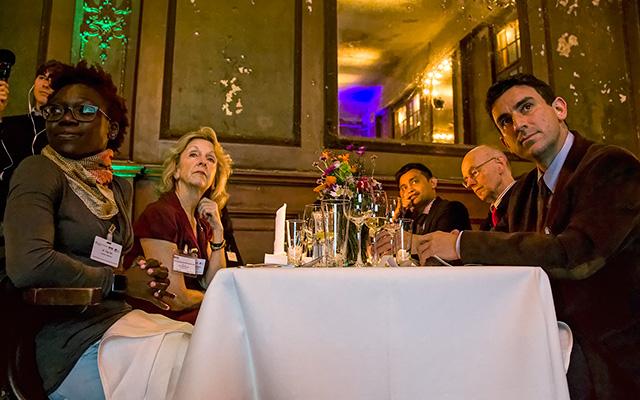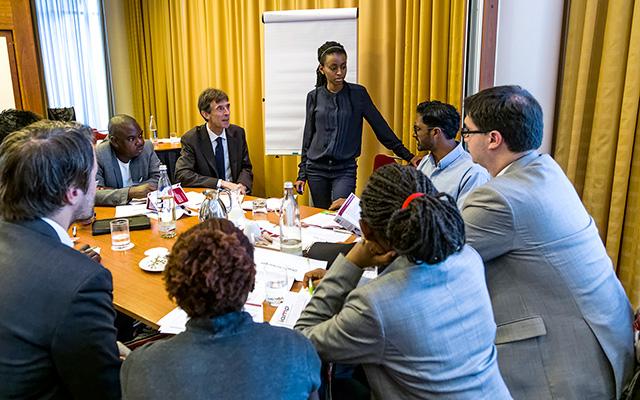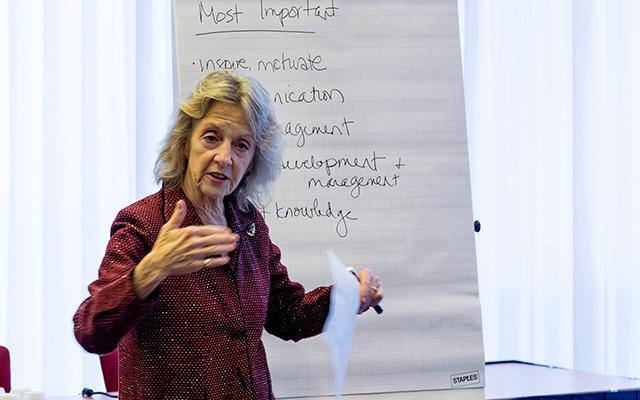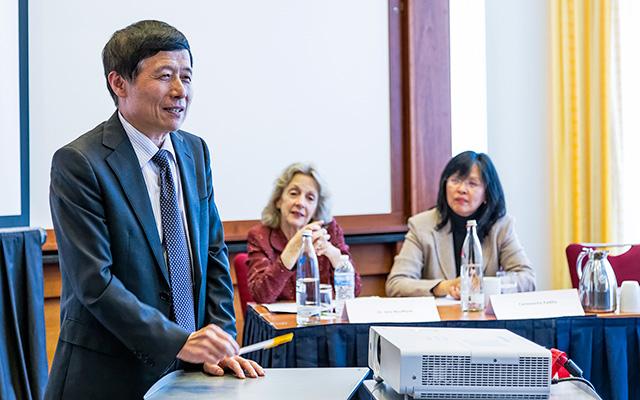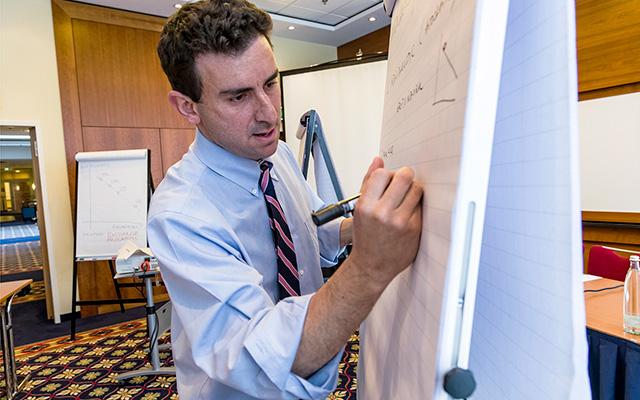![Tolulope Oni, senior research medical officer, Institute of Infectious Disease and Molecular Medicine at the University of Cape Town in South Africa [Photo: Paola di Bella | www.paoladibella.com]](/sites/default/files/inline-images/ypl-2014-tolulope-oni-2014-2.jpg)
Across much of the world, medical training is a period of intensive learning and practice focused on improving patients' health and saving lives. But while leadership is essential for healthcare institutions and even modest medical offices, medical schools rarely focus on cultivating those skills. Young professionals learn leadership almost by trial and error as they rise to positions of responsibility.
At the latest workshop of the InterAcademy Medical Panel’s (IAMP) Young Physician Leaders programme, 20 young physicians had an opportunity to explore key dimensions of leadership, with talks and exercises on how to take risks, how to support those who report to them, and how to deal with resistance.
“All the selected participants have tactical skills, and they all have very high levels of intellect,” said workshop organizer Jo Ivey Boufford, president of the New York Academy of Medicine. “The trick is helping them learn to use themselves as instruments."
“People, wherever they are in an organisation, have an opportunity to lead, to organize, to advance the goals and the purposes of a project, of an organization, of clinical practice, and to really make a change to improve health ultimately and – in the case of many of these individuals – the clinical care of patients.”
“Leadership is extremely important if you really want to get messages across and be effective in whatever you do,” added IAMP Co-chair Lai-Meng Looi of Malaysia. "Many people talk about sustainability with regards to society's use of natural resources. But sustainability is also important with regards to our human resources. By providing leadership training to top young people, the YPL programme is a concrete way that IAMP is working towards ensuring the sustainability of our health systems."
Looi and Boufford kick-started the Young Physician Leaders (YPL) programme four years ago. In 2010 they were co-chairing IAMP together; today Boufford takes the lead in running the training workshops.
The latest event in Berlin was the fourth edition of the YPL programme and gathered outstanding medical practitioners under the age of 40 from 16 countries to participate in the interactive workshop. The workshop was held immediately before last October’s World Health Summit in Berlin, Germany.
'A vision toward making a difference'
![Participants and staff for 2015 Young Physician Leaders workshop in Berlin [Photo: Paola di Bella | www.paoladibella.com]](/sites/default/files/inline-images/ypl-2014-group-photo_cropped_585x565.jpg) What makes a leader?
What makes a leader?
In times past, the prevailing attitude was that it is not possible to train leaders. The “great man theory”, popularized in the 19th century, proposed that they were born, not made.
“Those days are gone, however,” says Boufford. “Today's leadership theory focuses on the particular capabilities and talents of the individuals and how to make the most of them.”
The participants of the YPL programme are chosen through a global competition. From the pool of young medics nominated by IAMP’s member academies, an expert committee selects the cohort of 20 who are invited. This selection process not only takes into account the applicants' publications and CV: their personal qualities and aspirations are fundamental as well.
“We are looking for people who have a vision toward making a difference in the wider society,” Looi explained.
Tolulope Bella Awusah, for example, apart from being a lecturer at the University of Ibadan and Honorary Consultant in Child and Adolescent Psychiatry to the University College Ibadan, Nigeria, is also president-elect of the African Association for Child and Adolescent Mental Health. And Assad Antoine Eid, when he is not working as assistant professor in the Department of Anatomy, Cell Biology and Physiology of the Faculty of Medicine at the American University of Beirut, directs Ebda3, a non-profit organisation that aims to promote scientific reasoning and sciences as a way of encouraging change in the Lebanese community.
The YPLs were welcomed to Berlin by the Bayer Science & Education Foundation, one of the sponsors of the programme, who also arranged ice-breaking sessions and a visit two of the most important scientific institutions in Berlin: the Bayer HealthCare centre and the Max Delbrück Centre for Molecular Medicine.
The workshop on leadership development unfolded with the YPLs discussing their own leadership experiences and reflecting on the answers they gave to a questionnaire that was sent to them before the event. They then examined the challenges they face in their everyday work and the skills they need to improve to become better leaders. Examples of such skills could be self-confidence, self-regulation and time management.
They then analysed stereotypes of good leaders, especially from the participants' various regional perspectives. For instance, leaders from South America tend to be more autocratic than those from the United States, while physicians from Sweden seem to be the most democratic in European zone, followed by Lebanon, the United Kingdom and Hungary.
Rather than a series of formal lessons, YPL workshops are organized as an active discussion and, in this edition, four alumni from previous YPL events were invited to return to act as facilitators. This peer-learning is considered as important as the interaction with senior mentors.
'We are all facing similar problems'
The last day of the workshop was devoted to the development of individual personal leadership plans.
“It has caused me to look at myself and develop a leadership plan that I am looking forward to implement in the next year or so," said Kevin Ndai Omamo, a young Kenyan doctor currently serving the county government of Siaya as health advisor. "It has also given me the opportunity to see different cultures and communities and also to make friends.”
“I think that it is essential that we meet people from other health systems and other countries across the world,” says Mahiben Maruthappu, a YPL who serves as senior fellow to the CEO of NHS (National Health Service) England. “If you look at healthcare across the world, we are all facing very similar problems: Everywhere there are demographic shifts, technologies and drugs are costing more and more because of the recent financial crisis, and there are always budget constraints. It's interesting therefore to see the different solutions that people are producing for these common problems and I think that there is a lot we can learn from each other and that there's lot that can be said for collaboration to try to push things forward together.”
Since the workshop, Maruthappu has been named on the Forbes ‘30 Under 30’ list in healthcare.
Today, all the 2014 YPLs are back in their home countries, and together with the 68 other alumni of the programme, they form a critical mass of young physicians united by their commitment to improve health worldwide. Now they can work with and rely on an international network of mentors, colleagues and friends.
“I honestly believe that we tend to ignore the importance of preparing the youth for the future,” says Carmencita Padilla, an IAMP Executive Committee member from the Philippines. “The earlier we get the leaders on board, the easier it will be for them to cope with the problems and challenges that are emerging now as our society moves forward. I think we should replicate this workshop more frequently, in different parts of the world.”
Young Leaders at the World Health Summit
![YPL panellists at World Health Summit: From left, Fola Esan, IAMP Executive Committee member, Nigeria Academy of Science; Bach Tran Xuan, Institute for Preventive Medicine and Public Health, Hanoi Medical University, Vietnam; and Taopheeq Rabiu, Neurological Surgery Division, Department of Surgery, Federal Medical Centre, Nigeria [Photo: Paola di Bella | www.paoladibella.com]](/sites/default/files/inline-images/ypl-2014-summit_gallery.jpg) The Young Physician Leaders workshop was followed by the World Health Summit, an international conference held at the Federal Foreign Office in Berlin. For three days, politicians, academics, healthcare leaders and representatives of non-governmental organizations interested in medical issues discussed such topics as climate change and health, and healthy cities. During the opening ceremony of the summit, Lakmali Amarasiri, a YPL alumna from Sri Lanka, shared the stage with German Federal Foreign Minister Frank-Walter Steinmeier, German Federal Minister of Health Hermann Gröhe, French Minister of State for Development Annick Girardin, and Nobel Prize Laureate Barry J. Marshall. She had been invited to give a speech on behalf of the YPLs.
The Young Physician Leaders workshop was followed by the World Health Summit, an international conference held at the Federal Foreign Office in Berlin. For three days, politicians, academics, healthcare leaders and representatives of non-governmental organizations interested in medical issues discussed such topics as climate change and health, and healthy cities. During the opening ceremony of the summit, Lakmali Amarasiri, a YPL alumna from Sri Lanka, shared the stage with German Federal Foreign Minister Frank-Walter Steinmeier, German Federal Minister of Health Hermann Gröhe, French Minister of State for Development Annick Girardin, and Nobel Prize Laureate Barry J. Marshall. She had been invited to give a speech on behalf of the YPLs.
Building on her personal experiences, Amarasiri's talk challenged world health leaders to tackle the problem of brain drain from developing countries.
The World Health Summit programme also included a specific session designed by the YPL and chaired by two programme alumni: Bach Tran Xuan, lecturer in health economics at the Hanoi Medical University in Vietnam, and Taopheeq Bamidele Rabiu, neurosurgeon at the LAUTECH Teaching Hospital of Osogbo in Nigeria.
The session allowed the 2014 YPLs to describe challenges and discuss potential solutions to their most pressing problems: balancing work and family life, making research attractive to young physicians, and getting top young physicians involved in building research capacity. They agreed that to overcome these challenges, they must learn to work in teams and to delegate responsibility, support meritocracy and push for change against all impediments that are in place, such as the disconnection between funding for public health and funding for research.
Giovanni Ortolani


